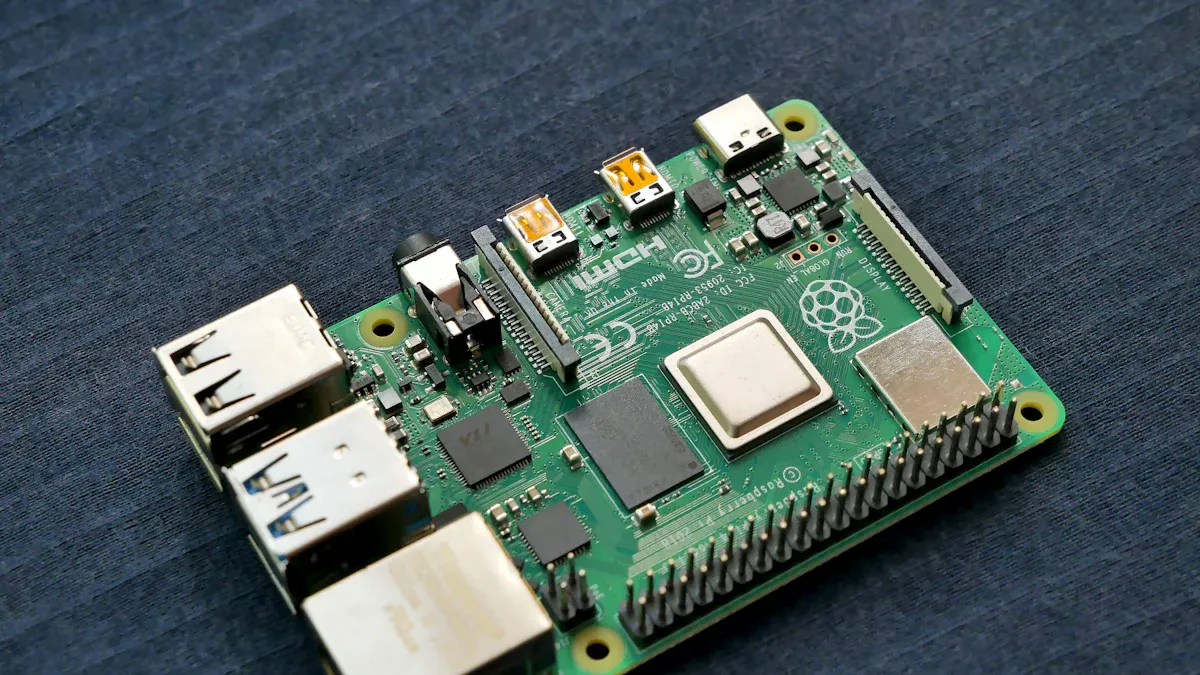
ITAR rules are very important in ITAR PCBA manufacturing. This is especially true for defense-related projects. These rules prevent sensitive technologies from going to the wrong people. Breaking these rules can lead to significant consequences. You might face large fines, lose your business license, or damage your reputation. Adhering to ITAR rules ensures your work is secure and builds trust with clients. It also helps you secure valuable defense contracts. To comply with the rules, you need strong controls, secure data, and proper export procedures. Doing this protects your business and contributes to national security.
Key Takeaways
Learn ITAR rules to keep defense technology safe. Following rules builds trust and helps win important jobs.
Sign up with the DDTC to work with ITAR items. This shows you care about following rules and protecting the country.
Use strong security and control who can access ITAR areas. Only let approved people in and use encryption to keep data safe.
Teach workers about ITAR rules often. Training helps them avoid breaking rules by mistake.
Check your compliance program regularly. These checks find problems and make sure you follow ITAR rules.
Understanding ITAR in PCBA Manufacturing

What is ITAR and its role in PCBA manufacturing?
ITAR stands for International Traffic in Arms Regulations. These are U.S. rules that control defense-related technology. In PCBA manufacturing, ITAR keeps military parts safe. It applies to items listed on the U.S. Munitions List (USML). The USML has 21 categories of defense items. If your company handles ITAR items, you must register with the DDTC. You also need to follow strict rules to stay compliant.
ITAR helps protect national security by keeping sensitive data safe. For example, companies must secure ITAR data from foreign workers. ITAR rules are updated often to match new technology and threats. This ensures the rules stay useful and effective.
Why ITAR compliance is critical for manufacturers
ITAR compliance is very important for military and aerospace projects. Breaking ITAR rules can lead to big fines or jail time. Fines can go up to $1,000,000 per violation. Not following ITAR can also hurt your reputation. You might lose important defense contracts.
To follow ITAR, you need strict rules in place. For example, non-U.S. workers cannot access ITAR areas. Only approved staff can handle sensitive data. You should also check your processes regularly. Following ITAR rules protects your business and helps national security.
Key industries impacted by ITAR regulations
Many industries are affected by ITAR rules, especially defense and military. Aerospace companies need ITAR-compliant PCBs for satellites and missiles. But ITAR rules have made things harder for U.S. space companies. Between 1996 and 2005, U.S. space firms lost global market share. ITAR restrictions were part of the reason.
European companies have used this to their advantage. They sell “ITAR-free” products to attract customers. This has drawn skilled workers and clients away from U.S. firms. It shows the need to balance ITAR compliance with staying competitive globally.
ITAR Compliance Requirements for PCBA Manufacturing
Registration with the DDTC
To follow ITAR rules, you must register with the DDTC. This is required for companies making, exporting, or brokering defense items on the USML. Registration shows your company is trusted to handle ITAR-controlled items.
The DDTC updates its rules often to guide manufacturers. For example, on March 25, 2024, it shared FAQs about joint ventures and registration. This helps companies in partnerships understand their shared duties under ITAR. Also, on August 28, 2023, a consent agreement revealed violations by Island Pyrochemical Industries Corporation. They were penalized for unauthorized brokering of ITAR-controlled items. This case shows why following DDTC rules is so important.
By registering with the DDTC, you prove your dedication to compliance. It also allows you to work on defense projects. This step protects sensitive data and builds trust in the defense industry.
Managing ITAR-controlled technologies
Handling ITAR-controlled items needs strict rule-following. These items include technical data and defense articles. If mishandled, they could harm national security. To manage them well, you need strong controls and clear records.
Good ITAR programs often include:
Clear records of all steps involving ITAR-controlled items.
Employee training to teach staff about ITAR rules.
Risk checks to find and fix possible problems.
For example, a defense company made a program with training, records, and risk checks. This kept them compliant and improved their position in the industry. By doing the same, you can protect sensitive data and stay competitive.
Export control and licensing essentials
Export control is key to ITAR compliance. If you export defense items or data, you need licenses from the DDTC using the DTrade system. U.S. citizens and some foreign individuals can apply for these licenses. For dual-use items, the EAR requires using the BIS SNAP-R system.
To meet export rules, follow these steps:
Get a Company Identification Number (CIN) for DTrade and SNAP-R.
Apply for export licenses through the right system.
Keep detailed records of all exports for tracking.
For instance, the SNAP-R system needs a CIN before license applications. This free process ensures only approved companies handle defense items. By following these steps, you avoid penalties and ensure safe transfers of ITAR-controlled items.
Tip: Always check if your products are on the USML. This helps confirm if they are ITAR-controlled and ensures you follow export rules.
Data security and access control protocols
Keeping data safe is key to following ITAR rules. You must protect ITAR-controlled data from being accessed by the wrong people. This means using both physical and digital security methods. By setting strict access rules, you can keep sensitive data safe and meet ITAR standards.
Start by limiting who can enter ITAR-controlled areas. Only approved workers should go into these spaces. Use ID badges or fingerprint scanners to check identities. For digital files, encrypt them and allow access only to trusted users. Adding multi-factor authentication (MFA) gives extra security. These steps stop unauthorized people from getting sensitive data.
Track and log every access attempt. This helps you spot any security problems. Check these logs often to ensure you follow ITAR rules. For example, if someone tries to access ITAR-controlled data without permission, you can act quickly to fix the issue.
Training your team is also very important. Teach them about ITAR rules and why data security matters. Workers should know how to handle sensitive data and avoid risks. A trained team makes your compliance efforts stronger.
Tip: Use software designed for ITAR compliance. These tools often include encryption, access controls, and logs, making it easier to follow ITAR rules.
Recordkeeping and reporting standards
Keeping good records is a must for ITAR compliance. You need to track every step involving ITAR-controlled items. This includes noting who entered restricted areas, what data was shared, and when exports happened. Good records help prove compliance during audits.
ITAR rules say you must keep records for at least five years. These records should be detailed and easy to find. For example, you might need to show visitor logs or export papers during an audit. An organized system helps you find this information fast.
The table below shows key metrics for ITAR compliance:
Metric | Description |
|---|---|
Citizenship screening and verification | Makes sure only approved people enter ITAR-controlled areas using ID checks. |
Comprehensive, audit-ready visitor logs | Keeps detailed logs for five years, helping with audits. |
Controlled access to restricted areas | Uses temporary badges and limits access based on visitor roles. |
Scalability for multi-site organizations | Standardizes processes across locations to ensure ITAR compliance everywhere. |
Set up a system to report ITAR activities. This includes telling the DDTC about changes in your work or possible rule violations. Regular reporting shows you are serious about compliance and helps avoid fines.
To make recordkeeping and reporting easier, use compliance software. These tools can collect data, organize records, and create reports automatically. Automation lowers mistakes and helps you meet ITAR rules.
Note: Always check your records and reporting systems to match the latest ITAR rules. Updating regularly helps you stay compliant and avoid problems.
ITAR Compliance Checklist for PCBA Manufacturers

Creating internal compliance rules
Making internal rules is key to following ITAR. These rules help your company follow ITAR and keep sensitive data safe. A good compliance plan should include steps for export checks, audits, and staff training. These actions protect ITAR-controlled items and meet the rules.
Start by finding the ITAR-controlled items in your work. Set rules for handling these items, like who can access them and where they are stored. Create ways to check compliance, such as regular audits and risk reviews. These steps help you fix problems early.
Tip: Write down your rules clearly and share them with everyone. Clear rules help employees know their duties and keep your company compliant.
Teaching employees about ITAR rules
Training your team is very important for ITAR compliance. Workers need to know the rules and how to follow them. Without training, they might break ITAR rules by mistake, risking your business.
Hold training sessions for workers who handle ITAR-controlled items. Teach them about export rules, data safety, and reporting steps. Use real-life examples to show why compliance matters and what happens if rules are broken.
Keep training updated with regular refreshers. ITAR rules change, so employees need to learn the latest updates. Online courses or experts can help with this.
Note: Encourage workers to ask questions and report problems. An open and honest workplace helps prevent rule-breaking and keeps your company safe.
Checking supply chain compliance
Your supply chain is crucial in ITAR PCBA work. If suppliers don’t follow ITAR, it can hurt your compliance. Checking supply chain compliance means reviewing partners and keeping strict controls.
Start by checking if your suppliers follow ITAR rules. Ask for proof, like DDTC registration or compliance records. Make contracts that explain your ITAR expectations clearly.
Watch your supply chain often to ensure they follow the rules. Do audits and ask for updates from suppliers to confirm compliance. If a supplier fails, act quickly to fix it or find a new partner.
Tip: Use software to track supply chain compliance. These tools help spot risks and manage ITAR materials better.
ITAR-compliant design and manufacturing processes
Making PCBs under ITAR rules needs careful planning. Every step must follow ITAR to keep defense technologies safe. This means using secure methods, strong quality checks, and keeping clear records.
Start by designing PCBs with ITAR in mind. Use tools that meet ITAR needs, like encrypted design files and access controls. Only approved workers should see ITAR-controlled designs. During manufacturing, set clear steps to check each stage. For example, add checkpoints to ensure materials and processes meet ITAR rules.
Following ITAR rules helps your business grow. Companies that comply often earn more, win more contracts, and keep clients longer. The table below shows these benefits:
Measure | ITAR-Compliant | Non-Compliant |
|---|---|---|
Revenue Growth | 7% | |
Contract Wins | 30% more | N/A |
Client Retention | 25% higher | N/A |
Operational Efficiency | 15% improvement | N/A |
These numbers show how ITAR compliance boosts success in defense work. By focusing on compliance, you protect sensitive data and grow your business.
Tip: Check your design and manufacturing steps often. Make sure they match the latest ITAR rules. This helps avoid problems and keeps your work compliant.
Verifying shipping and export procedures
Shipping ITAR-controlled items needs extra care. You must follow strict steps to keep defense technologies safe. First, check if the items are on the USML. This tells you if ITAR rules apply.
If ITAR applies, get export licenses from the DDTC. Use systems like DTrade to handle license requests. Make sure shipping papers, like invoices, show the ITAR-controlled status. Clear labels help avoid delays and follow export rules.
Packaging is also important. Use tamper-proof seals and strong containers to protect items. Label packages to show they are sensitive. Work with trusted shipping partners who know ITAR rules and handle defense items carefully.
Track shipments to monitor ITAR-controlled items. Keep detailed records of each shipment, including the recipient, route, and delivery. These records help with audits and prove compliance.
Note: Always double-check your shipping steps before sending ITAR-controlled items. This final review helps catch problems and ensures smooth shipping.
Maintaining ITAR Compliance
Keeping up with rule changes
ITAR rules change often to handle new risks. Staying updated is key to following these rules. Check updates from the DDTC regularly. This helps you keep your processes correct and compliant.
Sign up for DDTC newsletters or alerts. These give quick updates on rule changes and penalties. For example, recent updates explained joint venture duties and fines for breaking rules. Knowing these changes helps you adjust fast and avoid mistakes.
Set up a system to track and apply rule changes. Pick someone or a team to check updates and see how they affect your work. This way, you stay compliant and protect your business in the defense field.
Tip: Use software that tracks rule changes for you. It saves time and keeps you informed.
Doing regular checks and reviews
Regular checks find weak spots in your ITAR program. They help you fix problems with visitor rules, access, and data safety. Fixing these issues stops data leaks and keeps your work secure.
Checks also make sure visitor logs and screenings follow ITAR rules. For example, they confirm only approved people enter restricted areas. Good logs and screenings lower risks and improve safety for everyone.
Benefits of regular checks include:
Finding and fixing security problems.
Meeting access control rules.
Improving safety plans for emergencies.
Do checks every year or after big changes in your work. Use what you learn to improve your ITAR program and stay compliant.
Using tools to help with compliance
Compliance tools make ITAR rules easier to follow. They help with data safety, export tracking, and access control. These tools also lower mistakes caused by people, which often lead to rule-breaking.
The table below shows why compliance tools are helpful:
Benefit | What it Does |
|---|---|
Lower Fines and Costs | Tools reduce mistakes, avoiding big fines and legal trouble. |
Faster Certifications | Automated steps and smart tools speed up getting certifications. |
Fewer Errors | Better tracking and checks mean fewer mistakes and less wasted time or materials. |
Using compliance tools improves your ITAR efforts and makes your work smoother. These tools help you follow rules and stay competitive in defense projects.
Note: Pick tools that meet ITAR needs, like encryption and access tracking.
Working with legal and compliance experts
Working with legal and compliance experts is very important for ITAR compliance. These experts know the rules well and help you avoid mistakes. Their advice ensures your processes follow ITAR rules, keeping your business safe.
Legal experts explain ITAR rules and how they apply to your work. They find problems in your compliance and suggest ways to fix them. Compliance specialists focus on practical solutions. They create policies, train workers, and set up systems to follow ITAR rules.
A good example is Raytheon, which faced ITAR issues but fixed them with expert help. The table below shows what they did and the results:
Evidence Type | Description |
|---|---|
Cooperation with Investigation | Raytheon found evidence and shared key documents about ITAR issues. |
Factual Presentations | They gave presentations about ITAR problems they faced. |
Witness Facilitation | Raytheon helped with interviews during the investigation. |
Remediation Efforts | They hired experts and improved their compliance program. |
Penalty Credit | Raytheon got a 20% penalty reduction for their efforts. |
This shows how experts can help improve compliance and reduce penalties. Raytheon fixed its processes and saved 20% on fines by working with professionals.
You can also benefit by using expert advice in your ITAR strategy. Experts help you keep up with rule changes, do audits, and fix problems early. Their help makes your compliance stronger and keeps your business safe.
Tip: Choose experts with real experience in ITAR compliance. Their knowledge can save you time, money, and trouble.
ITAR rules are key in making PCBs for defense projects. Following these rules keeps important technology safe and builds client trust. Checking your processes often helps you follow changing rules. Regular reviews find problems and improve how you follow ITAR.
Training workers and checking suppliers protect your business. These actions also make your company respected in defense work. Staying focused on ITAR rules keeps the country safe and helps your business grow over time.
FAQ
What is the first step to achieving ITAR compliance?
You need to sign up with the Directorate of Defense Trade Controls (DDTC). This shows you are allowed to manage ITAR items and care about following the rules.
How can you ensure your employees follow ITAR rules?
Train your workers regularly. Teach them about ITAR rules, keeping data safe, and export steps. Use real-life examples to make lessons clear and interesting.
Do small businesses need to comply with ITAR?
Yes, ITAR applies to all companies working with defense items. Breaking the rules can lead to big fines and losing contracts.
How often should you review your ITAR compliance program?
Check your program every year or after big changes. Regular reviews find problems and make sure your work follows ITAR rules.
Can software help with ITAR compliance?
Yes, software makes ITAR tasks easier, like keeping records and tracking exports. It lowers mistakes and helps you follow the rules better.
See Also
An In-Depth Overview of Steps in PCBA Manufacturing
Essential Strategies for Overcoming PCBA Manufacturing Obstacles
Ways to Improve Quality Assurance in PCBA Production
Techniques to Boost Workflow Effectiveness in PCBA Production